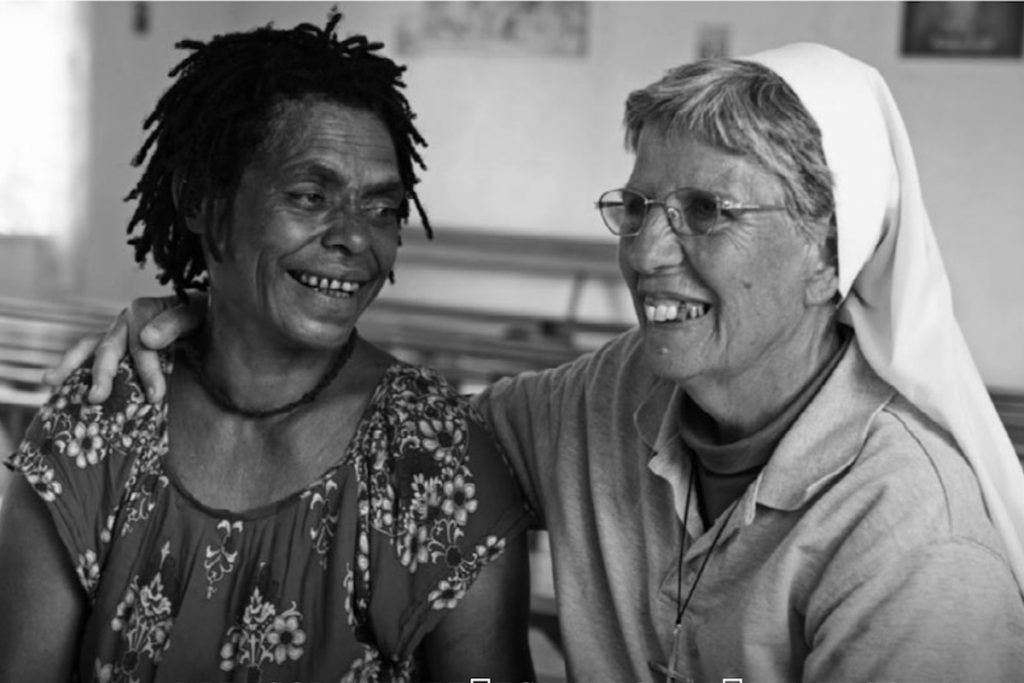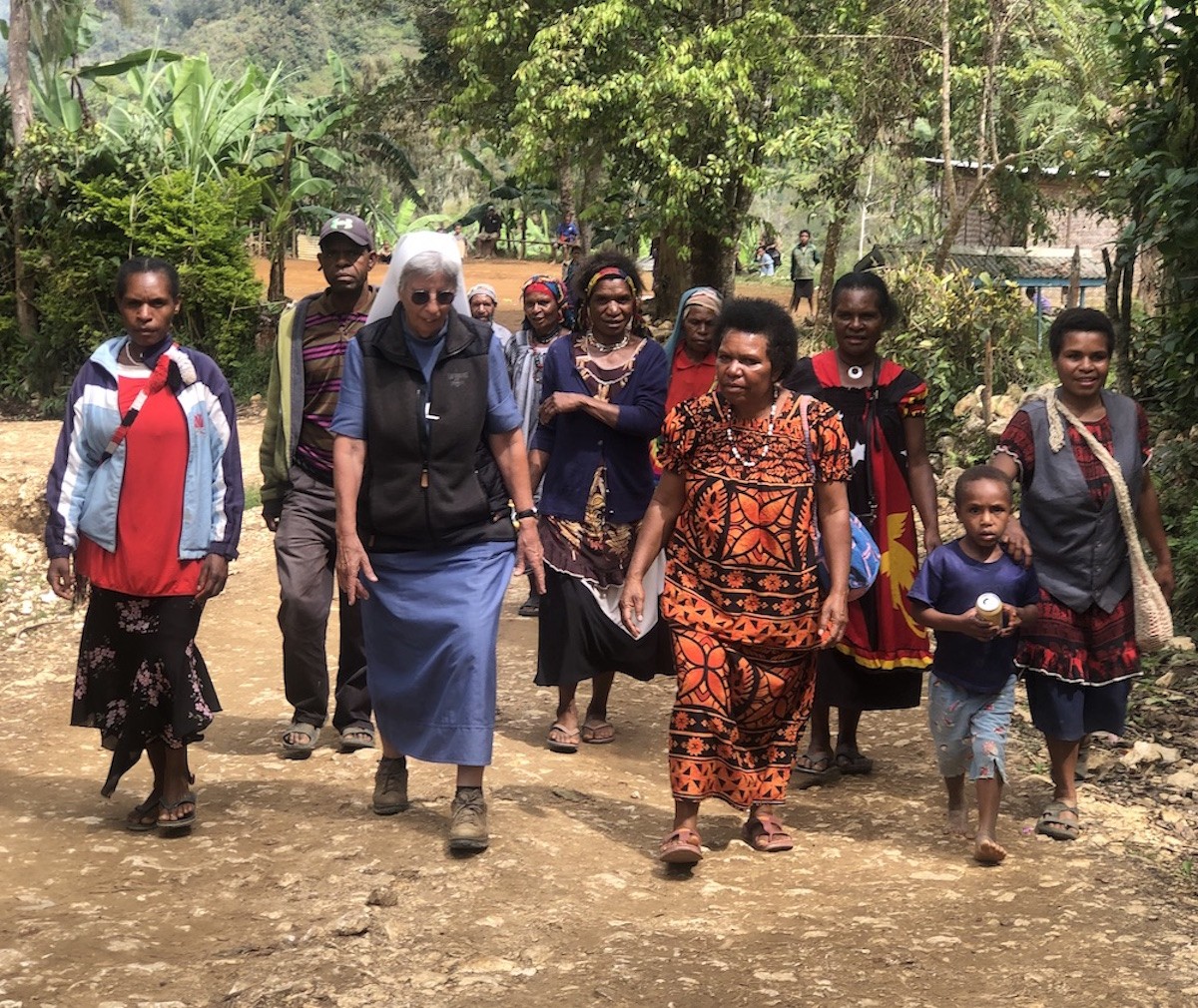On Aug. 10, 2012 a defenseless mother fought for her life in the Highlands of Papua New Guinea. The woman, Christina, was surrounded by hundreds of villagers. Several men had tied her up and lit a pyre. Accused of sorcery, she had already been tortured with red-hot irons. The incident was like a scene from 500 years ago.
Amidst the shouting and chanting one woman boldly stood up to mob. “Stop the madness, release the woman!” shouted the woman who was Swiss born missionary, Sister Gaudentia Meier.
The elderly nun hurried into the village square to try and stop what was occurring but was beaten off by members of the mob.
“Get out, otherwise we’ll burn you as a witch too,” they screamed at the nun who’d worked as a nurse and midwife in the Mendi Diocese for almost 50 years.
The mob had made Christina a scapegoat and, in her desperation, the accused woman came up with a trick — she grabbed a stone and simulated a witch’s birth. The stone was smeared with mud and blood and the men considered it to be the evil in her. They finally let her go.
Sister Gaudentia took Christina to hospital and, along with other Catholics, including another Swiss-born nun, Sister Lorena Jenal, helped the woman with her emotional wounds.
Sister Lorena said that Christina, who has a son, is now doing well.
But the men who attacked Christina are still at large and she still fears for her life. “I want to live in peace and I want justice, otherwise I will never find peace,” Christina said.
Eight years down the line, and sorcery related accusations and their related violence continue in Papua New Guinea.
On Easter Sunday, this year, three innocent women were burned and tortured over accusations of sorcery in the southern Highlands of Papua New Guinea while local Catholics were at Mass.
“One cannot ignore the diabolical irony of this,” wrote Sister Lorena who is a Franciscan Sister of Divine Providence from Baldegg.
During Holy Week the women had been accused of witchcraft (locally called ‘sanguma’) and causing the death of an elderly man who died from a combination of asthma and kidney failure.
Sister Lorena said Magdalena, the oldest of the three women, died on Oct. 11 from her injuries from the torture which included sexual torture.
“The funeral service [for her] was not just a service, it was a cry for justice for Magdalena’s sake; something like that can never be done again,” Sister Lorena said.
The nun said that her team and the parish did their utmost to inform local leaders, pastors of different denominations and court officials to understand that Magdalena was innocent and how she died from the torture.
“The result was a promise, that in our parish this will never happen again,” Sister Lorena said.
“A 16-year-old boy who was involved in doing the torture came to see me last week and asked to be helped,” she added. “He had not realized what he had done and needed help in order to help others later to stop that irrational evil because he and everyone is born of a mother and nursed by a mother.”

Bishop Donald Lippert of Mendi in the Southern Highlands province told CNA that this kind of violence is an ongoing problem.
“The Catholic Church, and our Catholic faith, is the answer to this darkness. And bringing people into relationship with Jesus and teaching the dignity of the human person are the best ways of changing people’s attitudes and changing their behavior as well,” he said.
Sister Lorena said that in the Pangia area of the highlands two women were also tortured and killed in June. “A new case came in from Kirene. I went to Kip with the victim I took care of for almost two weeks and was not received well,” she said.
In the middle of July, a school student died unexpectedly in a village of the Upper Karinj pastoral area resulting in three women being accused of witchcraft.
Immediately a team from Mendi Diocese — consisting of Father Alex Remba (parish priest of the pastoral area), Father Robert Gigmai (pastoral vicar), Sister Lorena, Winnie William (diocesan health manager), Roderick Irepo (diocesan development coordinator), Daniel Beli (Catholic education secretary) — went to the village.
The team found a gathering of people who had already prepared heated metal plates which they were going to burn the three accused women. The people were surprised by the arrival of the team from the diocese who sought to oppose their plans.
“In these situations, there are often three groups of people,” Bishop Lippert said. “The leaders who sanction what is happening and remain somewhat in the background,” he said.
“The group who actually carry out the torture and the murder; who are usually younger men and often involved with the abuse of marijuana.
“Finally, the people are there as spectators who by their presence give their tacit support to what is happening; sometimes out of fear.
“Our team members did not hesitate to confront those who appeared to be conducting this spectacle. The younger men spoke threatening words to the members of the team who showed no fear and answered all of these objections from the perspective of our Catholic faith.”
At one point one of the young men said that this was a ‘spiritual’ problem which led to one of the priests — Father Robert — to say that spiritual problems are to be handled in the church.
According to witnesses, Father Robert was able to make them understand that what they were planning to do was the work of the devil.
After a long, heated argument the leaders of the mob backed down, and the attitude of the leaders began to shift from belligerence to shame and finally the women were saved. Since then some of the team members have followed up to make sure that the women will remain safe for the long term.
The issue of sorcery accusation violence is ongoing in Papua New Guinea and it is something that the Church, working with people of goodwill, is confronting.
Bishop Lippert along with Archbishop Anton Bal, Bishop Arnold Orawae, and other bishops have been involved in addressing the issue. Anton Lutz, a Lutheran lay-missionary, as well as the group Senism Pasin are also very active in addressing it.
Aug. 10 this year was the first international day against sorcery accusation violence (SAV). The day was announced by Missio, the mission outreach agency of the German Catholic bishops.
“This international day draws attention to a new wave of human rights violations in more than 30 countries. For too long, people have overlooked and kept silent about the fact that misanthropic superstition is used to blame women, children and men as scapegoats for social problems”, said Pastor Dirk Bingener, president of Missio in Aachen, Germany.
- More articles from Church Alive
COVID-19 has brought out the best in us, as well as the worst
How an isolated PNG diocese dealt with a global pandemic
This is an edited article from Church Alive a publication of the Catholic Bishops Conference Papua New Guinea & Solomon Islands.







